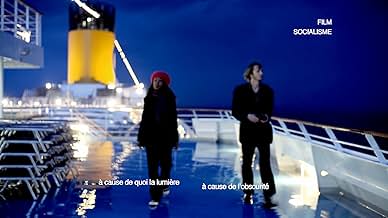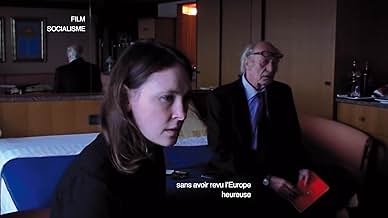IMDb रेटिंग
5.7/10
3 हज़ार
आपकी रेटिंग
अपनी भाषा में प्लॉट जोड़ेंThe passengers on a Mediterranean cruise enjoy their luxuries as a small family struggles with overbearing media attention.The passengers on a Mediterranean cruise enjoy their luxuries as a small family struggles with overbearing media attention.The passengers on a Mediterranean cruise enjoy their luxuries as a small family struggles with overbearing media attention.
- पुरस्कार
- 5 जीत और कुल 2 नामांकन
Agatha Couture
- Alissa (segment "Des choses comme ça")
- (as A. Couture)
Mathias Domahidy
- Mathias (segment "Des choses comme ça")
- (as M. Domahidy)
Quentin Grosset
- Ludovic (segment "Des choses comme ça")
- (as Q. Grosset)
Maurice Sarfati
- (segment "Des choses comme ça")
- (as M. Sarfati)
Nadège Beausson-Diagne
- Constance (segment "Des choses comme ça")
- (as N. Beausson)
Dominique Devals
- (segment "Des choses comme ça")
- (as D. Devals)
Marine Battaggia
- Florine "Flo" Martin (segment "Quo vadis Europa")
- (as M. Battaggia)
फ़ीचर्ड समीक्षाएं
Far to be a Godard admirer, I was real seduced by this film, a mix of cultural references about Mediteranean area, a good pledge for language as obstacle of understanding, eccentric, innovative, absurd in essence, proposing characters and theirs memories and believes , but not exactly a story.
A film about time and masks and past and facts as pieces of puzzle , it is a provocative invitation to viewer to create his explanations or - and doubts.
For me, the old watch is the main scene defining this film who remains a clash by fragments of doczmentary, stains of kitsch and rediscover of past. All, in essence, in the most honest manner.
A film about time and masks and past and facts as pieces of puzzle , it is a provocative invitation to viewer to create his explanations or - and doubts.
For me, the old watch is the main scene defining this film who remains a clash by fragments of doczmentary, stains of kitsch and rediscover of past. All, in essence, in the most honest manner.
I get quite excited at the prospect of a new Godard. Not that I see his work as any ultimate example. It's not. But somehow it is in a different milieu to most films you can watch. Like poetry, it's not about the words or images, but the joy that comes from exploring, from original thought. Sound and vision used not to entertain but to seek deeper levels than can be expressed in prose or 'narrative cinema as we know it.' Yet the slew of bad reviews prepared me for the worst. Perhaps age had caught up with the grand master of Nouvelle Vague? Or perhaps Godard was not beyond playing a joke on his audience, just to see what they make of it?
Omens weren't great. A small auditorium and no more than a dozen people there as I walk in. Some obviously by mistake. As they walk out halfway through. But I am already entranced. Wondering if I will be able to see it again in the final screening tomorrow. Looking forward to the DVD so I can stop-start for quotes that send my head spinning like I'm back in my alma mater's philosophy class. A dizzying array of original and masterly techniques. And, like poetry, enough fluidity to offer meanings in ways that suit the individual viewer (persons who walked out excepted).
A warning: there is a 'looking for answers' but no real story. On a difficulty level, this film is much harder than Breathless, Le Mepris, or Vivre Sa Vie. It is warmer and more captivating than Weekend or Made in USA, but only just. Neither does it have the clear expository style of his last most recent well-known movie, Notre Musique. It has three main sections: 1 - scenes on a Mediterranean cruise ship ('Things'), 2 - a European family ('Our Europe'), and 3 - scenes of conflict and war ('Humanities'). Each seeks understanding to certain questions on an individual, interpersonal and political level.
The first section held my attention the most. Inside the cruise ship is a plethora of "things" (if this was Godard of yesteryear, I'd maybe have written 'bourgeois distractions.') Only when we go outside, or see the light shine in, do we experience crisp photography, scenes of genuine beauty, and people spending their time at least trying to solve some of life's deeper puzzles. Perhaps this is just my own interpretation, but I like the way it is depicted visually. Money is a 'common good' – like water – but party-people onboard use it for nothing but bloated consumerism. Meaningless dance classes and revelry. As two people engage in philosophical discourse outside the main hall, a woman repeatedly falls against the glass partition. Is she dancing and letting her spirit free? Apparently not – she falls face down into the swimming pool.
There is a young girl seen frequently with an old man. Something strange there? A hooker perhaps? A maybe rather a scholar or seeker of truth – availing herself of the rich variety of elderly experience onboard (a philosopher, a UN bureaucrat, a Palestinian ambassador, and so on).
Characteristic Godardian effects are used with casual precision. There is no attempt at reality if it stands in the way of the point he is making. Such as when the background noise cuts out momentarily for the word 'happiness' to occurs in the girl's dialogue. Deliberate camera distortions emphasise an alcohol-sodden mentality of the majority of passengers, images often obscenely blurred, as if taken on a mobile phone. Or the mother in Section Two who talks to the camera about how she is totally unaware of the part she is playing.
There are more hidden references than an afternoon of Tarantino movies. Except, unlike Tarantino's work, Godard is not entertaining pub quiz movie geeks; but giving clues to further meanings within his experimental and exploratory work. A young lad gives a young woman a copy of 'La Porte Entroite,' (a coming of age novel). There are nods to Husserl's philosophical geometry which fit the film but will need hours of study to fully appreciate (we see a projection of a man lecturing on 'geometry as origin' – to an empty auditorium). And Balzac's 'Illusions Perdues,' which anticipates themes of aristocracy vs poverty as well as journalism as intellectual prostitution. And don't miss the homage later to Battleship Potemkin's Odessa Staircase slaughter.
Dialogue sparkles from witty – "The United Nations have been somewhat disunited since 1948," to surreal and Zen-like – "Once in 1942 I have encountered nothingness . . ." I'm quoting from memory and leaving the end of the quote for you to enjoy on screen.
The individual's relation to government is addressed by the adolescents in the second Section, posing a difference between the State and Society. The dream of the State is to be 'one'; whereas the dream of the Individual is to be two, to 'pair up.' Aggressively intrusive foreigners demanding driving directions are given a cold shoulder ("Go and invade some other country!") An intrusive camera, making a documentary about a coming election, similarly distances everyone from any (inner) reality.
Some of the phrases from Section Two bleed over into scenes of Section Three bloodshed. The young girl wants people to, "learn to see before learning to read." Godard's intertitles come fast and frequent, and in many different languages. At one point, a prayer in Hebrew and a prayer in Arabic are overlaid, visually and aurally. It recalls Godard's offhand response to the question, "Peace In the Middle East - when?" by replying, "As soon as Israel and Palestine introduce six million dogs and stroll with them as neighbours who don't speak, who don't speak of something else." Cinema is a remarkable opportunity sometimes to communicate without speaking those things which are often too difficult, or too sensitive, or simply whitewashed of their core by aimless chatter. Or by narrative movies.
Omens weren't great. A small auditorium and no more than a dozen people there as I walk in. Some obviously by mistake. As they walk out halfway through. But I am already entranced. Wondering if I will be able to see it again in the final screening tomorrow. Looking forward to the DVD so I can stop-start for quotes that send my head spinning like I'm back in my alma mater's philosophy class. A dizzying array of original and masterly techniques. And, like poetry, enough fluidity to offer meanings in ways that suit the individual viewer (persons who walked out excepted).
A warning: there is a 'looking for answers' but no real story. On a difficulty level, this film is much harder than Breathless, Le Mepris, or Vivre Sa Vie. It is warmer and more captivating than Weekend or Made in USA, but only just. Neither does it have the clear expository style of his last most recent well-known movie, Notre Musique. It has three main sections: 1 - scenes on a Mediterranean cruise ship ('Things'), 2 - a European family ('Our Europe'), and 3 - scenes of conflict and war ('Humanities'). Each seeks understanding to certain questions on an individual, interpersonal and political level.
The first section held my attention the most. Inside the cruise ship is a plethora of "things" (if this was Godard of yesteryear, I'd maybe have written 'bourgeois distractions.') Only when we go outside, or see the light shine in, do we experience crisp photography, scenes of genuine beauty, and people spending their time at least trying to solve some of life's deeper puzzles. Perhaps this is just my own interpretation, but I like the way it is depicted visually. Money is a 'common good' – like water – but party-people onboard use it for nothing but bloated consumerism. Meaningless dance classes and revelry. As two people engage in philosophical discourse outside the main hall, a woman repeatedly falls against the glass partition. Is she dancing and letting her spirit free? Apparently not – she falls face down into the swimming pool.
There is a young girl seen frequently with an old man. Something strange there? A hooker perhaps? A maybe rather a scholar or seeker of truth – availing herself of the rich variety of elderly experience onboard (a philosopher, a UN bureaucrat, a Palestinian ambassador, and so on).
Characteristic Godardian effects are used with casual precision. There is no attempt at reality if it stands in the way of the point he is making. Such as when the background noise cuts out momentarily for the word 'happiness' to occurs in the girl's dialogue. Deliberate camera distortions emphasise an alcohol-sodden mentality of the majority of passengers, images often obscenely blurred, as if taken on a mobile phone. Or the mother in Section Two who talks to the camera about how she is totally unaware of the part she is playing.
There are more hidden references than an afternoon of Tarantino movies. Except, unlike Tarantino's work, Godard is not entertaining pub quiz movie geeks; but giving clues to further meanings within his experimental and exploratory work. A young lad gives a young woman a copy of 'La Porte Entroite,' (a coming of age novel). There are nods to Husserl's philosophical geometry which fit the film but will need hours of study to fully appreciate (we see a projection of a man lecturing on 'geometry as origin' – to an empty auditorium). And Balzac's 'Illusions Perdues,' which anticipates themes of aristocracy vs poverty as well as journalism as intellectual prostitution. And don't miss the homage later to Battleship Potemkin's Odessa Staircase slaughter.
Dialogue sparkles from witty – "The United Nations have been somewhat disunited since 1948," to surreal and Zen-like – "Once in 1942 I have encountered nothingness . . ." I'm quoting from memory and leaving the end of the quote for you to enjoy on screen.
The individual's relation to government is addressed by the adolescents in the second Section, posing a difference between the State and Society. The dream of the State is to be 'one'; whereas the dream of the Individual is to be two, to 'pair up.' Aggressively intrusive foreigners demanding driving directions are given a cold shoulder ("Go and invade some other country!") An intrusive camera, making a documentary about a coming election, similarly distances everyone from any (inner) reality.
Some of the phrases from Section Two bleed over into scenes of Section Three bloodshed. The young girl wants people to, "learn to see before learning to read." Godard's intertitles come fast and frequent, and in many different languages. At one point, a prayer in Hebrew and a prayer in Arabic are overlaid, visually and aurally. It recalls Godard's offhand response to the question, "Peace In the Middle East - when?" by replying, "As soon as Israel and Palestine introduce six million dogs and stroll with them as neighbours who don't speak, who don't speak of something else." Cinema is a remarkable opportunity sometimes to communicate without speaking those things which are often too difficult, or too sensitive, or simply whitewashed of their core by aimless chatter. Or by narrative movies.
We recently screened Godard's contentious "Film Socialisme" at a small art-house cinema in Boulder, CO where I live and I couldn't be more delighted by the response. Namely, there were many people who were infuriated about the film, leaving in droves and upset that such a film both exists and/or would be shown at said theater (the only art-house theater in the city, actually).
One patron was even angry enough to leave a note behind for the concessions stand stating that she "speaks French" and was particularly upset about the subtitles of the film. She'd probably be the kind of person to get upset about the "punctuation problems" in ee cummings' poems. And don't get her started on Andy Kaufman!
First and foremost, "Film Socialisme" is without a doubt a beautiful film. The way in which it was shot and edited is visionary, a true patchwork of modern/post-modern society/cinema today. The kind of film that -- as with the majority of Godard's ouevre -- may be ahead of its time but will certainly be enjoyed by sincere cinephiles looking for something new, bold and fresh. Beyond any sense of provocation, there were true moments of visual/audio splendor that simply cannot be seen anywhere else (by sheer merit of the fact that, yes I agree, no one else would be "allowed" to make/distribute such a film; and that in itself is important when considering whether or not you should spend the money/time on seeing it in the theater).
Clearly, the subtitles of the film -- which are minimalist and fractured (clearly intentionally) - - are a play on one of the film's many themes: the breakdown of communication and language (think Gertrude Stein texting you viz. her thoughts on modern society). That people are growing angry about the challenging and innovative way Godard has aptly chosen to play even now with the very subtitles of his film is extremely exciting. Not to mention the fact that, again, aside from the "gimmick," the subtitles become a poetic innovation unto themselves in which Godard combines words into fascinating portmanteaus that invoke clever wordplay a la some of the greater avant-garde/surrealist literature.
He has finally gone that extra distance in deconstructing every aspect of the film (including, at times, a brilliant dalliance with the audio mix that clearly has confounded viewers a la similar experiments by the likes of the Velvet Underground, Andy Warhol, Andy Kaufman and La Monte Young; there are moments in which you truly wonder whether or not there is an "actual" breakdown of the film being shown -- especially if you're lucky enough to see this film through digital projection; "Is there something wrong with the disc?! Oh no!!" Very exciting. Audience interaction, indeed!)
Ultimately and as per Godard's typical (?) MO, the film is a firm lashing of the perpetuated bourgeois culture (particularly in America; hence his giving us the finger for not knowing French or the many other languages interspersed throughout the polyglot film; "You don't want to learn another language? Fine. Try figuring THIS out!!")
Like Lenny Bruce and a younger John Waters, with "Film Socialisme" Godard is shaking up audience members -- particularly his "greatest fans" -- by provoking them in ways they may not be comfortable with, in ways that may simply repel them. "You want to be shocked? I'll shock you, but be prepared to be, well c'mon: shocked." We don't go to Godard films to watch a clear narrative or to understand everything that happens. It's poetry, it's visual/audio artistry, it's -- ultimately -- play and experimentation. And Godard has once again succeeded in creating something that will not allow us to remain static in our seats. If you can't handle that, he is saying as always, then feel free to leave and don't forget to ask for a refund on your way out.
The megaplex is right down the street. Or, hey, buy a copy of "Breathless" and watch a nice "really weird and wild!!!!" noir film with a plot. It's all up to you!
In the end, the film defies quotation marks. If you want "challenging," you've got plenty of it on Netflix. If you want challenging, however, see "Film Socialisme." Just don't be too upset if it... challenges you.
One patron was even angry enough to leave a note behind for the concessions stand stating that she "speaks French" and was particularly upset about the subtitles of the film. She'd probably be the kind of person to get upset about the "punctuation problems" in ee cummings' poems. And don't get her started on Andy Kaufman!
First and foremost, "Film Socialisme" is without a doubt a beautiful film. The way in which it was shot and edited is visionary, a true patchwork of modern/post-modern society/cinema today. The kind of film that -- as with the majority of Godard's ouevre -- may be ahead of its time but will certainly be enjoyed by sincere cinephiles looking for something new, bold and fresh. Beyond any sense of provocation, there were true moments of visual/audio splendor that simply cannot be seen anywhere else (by sheer merit of the fact that, yes I agree, no one else would be "allowed" to make/distribute such a film; and that in itself is important when considering whether or not you should spend the money/time on seeing it in the theater).
Clearly, the subtitles of the film -- which are minimalist and fractured (clearly intentionally) - - are a play on one of the film's many themes: the breakdown of communication and language (think Gertrude Stein texting you viz. her thoughts on modern society). That people are growing angry about the challenging and innovative way Godard has aptly chosen to play even now with the very subtitles of his film is extremely exciting. Not to mention the fact that, again, aside from the "gimmick," the subtitles become a poetic innovation unto themselves in which Godard combines words into fascinating portmanteaus that invoke clever wordplay a la some of the greater avant-garde/surrealist literature.
He has finally gone that extra distance in deconstructing every aspect of the film (including, at times, a brilliant dalliance with the audio mix that clearly has confounded viewers a la similar experiments by the likes of the Velvet Underground, Andy Warhol, Andy Kaufman and La Monte Young; there are moments in which you truly wonder whether or not there is an "actual" breakdown of the film being shown -- especially if you're lucky enough to see this film through digital projection; "Is there something wrong with the disc?! Oh no!!" Very exciting. Audience interaction, indeed!)
Ultimately and as per Godard's typical (?) MO, the film is a firm lashing of the perpetuated bourgeois culture (particularly in America; hence his giving us the finger for not knowing French or the many other languages interspersed throughout the polyglot film; "You don't want to learn another language? Fine. Try figuring THIS out!!")
Like Lenny Bruce and a younger John Waters, with "Film Socialisme" Godard is shaking up audience members -- particularly his "greatest fans" -- by provoking them in ways they may not be comfortable with, in ways that may simply repel them. "You want to be shocked? I'll shock you, but be prepared to be, well c'mon: shocked." We don't go to Godard films to watch a clear narrative or to understand everything that happens. It's poetry, it's visual/audio artistry, it's -- ultimately -- play and experimentation. And Godard has once again succeeded in creating something that will not allow us to remain static in our seats. If you can't handle that, he is saying as always, then feel free to leave and don't forget to ask for a refund on your way out.
The megaplex is right down the street. Or, hey, buy a copy of "Breathless" and watch a nice "really weird and wild!!!!" noir film with a plot. It's all up to you!
In the end, the film defies quotation marks. If you want "challenging," you've got plenty of it on Netflix. If you want challenging, however, see "Film Socialisme." Just don't be too upset if it... challenges you.
I'll admit that I've only seen a handful of Jean-Luc Godard's movies. "Film socialisme" is the latest. Very bizarre movie. In fact, it doesn't really emphasize a plot. It's hard to tell what the movie's emphasis is supposed to be, with the focus on a group of people aboard a cruise ship in the Mediterranean. Maybe Godard wanted to address the use of certain places as tourist meccas, but I couldn't be certain. With current events in the world, it's probably significant that the movie includes Palestine.
I'd like to see the rest of Godard's movies, but I doubt that I'll ever be able to truly understand what sort of point he was trying to make with this one.
Watch for singer-songwriter Patti Smith in a brief appearance.
I'd like to see the rest of Godard's movies, but I doubt that I'll ever be able to truly understand what sort of point he was trying to make with this one.
Watch for singer-songwriter Patti Smith in a brief appearance.
Can we all get over the "challenging" provocations that this Film attempts to offer. Forgive a potential Agism, but in the spirit of class conscious critique: This is a sign of late Godard, complicit in his Bourgeois canonization, making ineffectual meditations on a a medium already robust, ubiquitous and politically affective. I'm speaking of course about Video. A previous reviewer mentioned Ryan Tracartin - This film is at least 20 years behind Ryan Trecartin's most trivial undergrad work. Godard mobilizing the distancing, alienating politics of a pseudo-left closeted Eurocentrist in order to promulgate a consistent dominance over "Art House" cinema. Honestly what the blood is this film? a further denigration of the kinds of education received in low income areas of the United States, Northern Africa, Southeast Asia and Eastern Europe? Who is this this film standing up for? and if it stands up for no one then why is this nihilism necessary? The fractured subtitles are absolutely insulting - There is no transformative translation ala Benjamin, no generative deconstruction, no Stein, no Saurraute , no performative language at all - we are left with nothing but masturbatory sloganism (and not a kind of sloganism which implodes on itself in order to critique a contemporary state of language, rather a sloganism which, with full self awareness, alienates all those accept for the most privileged, most geographically/economically/culturally entitled). This film is no "challenge" to its audience as the audience for late Godard is ALREADY educated, already leftist (or at least conventionally Liberal) already enlightened as to the ornate delicacies of high cinema and already aware of and experienced with cultural forms outside of the myopic mainstream. Therefore, this film seems unnecessarily difficult, a poorly informed cloying attempt at relevance in a digital age. The Film says nothing about its medium other than a tired Brechtian breaking of verisimilitude at the beginning (a fruitless technique, as video implicitly points to its own making(s) given its unmistakable and highly recognizable fidelity) and is years behind even the most the primitive works of contemporary video art. It seems Godard did not realize the impact that Histoire(s) du cinema had on the rest of the world, and that the rest of the world has taken something he helped to pioneer and ran far far away from beyond it. I can't help but feel that Harun Farocki already made this film in the 80s and it was far more innovative, "challenging", inclusive and all around less insulting than this ultimately apolitical irreverency. There is nothing about identity in this film and an absolute disregard for the filmmaker's own place of power in the discursive grid (ie, heterosexual, white, wealthy, Western, mutilingual, gendered male).
to the reviewer who in response to the fractured subtitles said "you should learn French!" - maybe in another lifetime free of inhibitory systemic inhibitors, financial constraint and economic-racial-historical determinism we could all take up this task of Eurocentric cultural Enlightenment, but for now I'll settle for at least a concession of legibility.
to the reviewer who in response to the fractured subtitles said "you should learn French!" - maybe in another lifetime free of inhibitory systemic inhibitors, financial constraint and economic-racial-historical determinism we could all take up this task of Eurocentric cultural Enlightenment, but for now I'll settle for at least a concession of legibility.
क्या आपको पता है
- ट्रिवियाThe film did not include traditional English language subtitles for releases in countries that spoke such language. Instead, the subtitles were in "Navajo English", a translation that baffled many critics and audience members.
- गूफ़Someone claims that Napoleon founded the Comédie-Française in 1812 in Moscow. Actually, it was founded in 1680 by Louis XIV.
- भाव
Rebecca (segment "Des choses comme ça"): [dialogue continuity] You're absolutely right: I don't love any "people." Not French, not North American, not German. Not Jewish people, not black people. I love only my friends... When there are any.
- कनेक्शनEdited from Bronenosets Potyomkin (1925)
- साउंडट्रैकMamita mia
Performed by Ernst Busch
टॉप पसंद
रेटिंग देने के लिए साइन-इन करें और वैयक्तिकृत सुझावों के लिए वॉचलिस्ट करें
- How long is Film socialisme?Alexa द्वारा संचालित
विवरण
- रिलीज़ की तारीख़
- कंट्री ऑफ़ ओरिजिन
- आधिकारिक साइट
- भाषाएं
- इस रूप में भी जाना जाता है
- Film Socialism
- फ़िल्माने की जगहें
- उत्पादन कंपनियां
- IMDbPro पर और कंपनी क्रेडिट देखें
बॉक्स ऑफ़िस
- US और कनाडा में सकल
- $42,925
- US और कनाडा में पहले सप्ताह में कुल कमाई
- $4,526
- 5 जून 2011
- दुनिया भर में सकल
- $2,22,079
इस पेज में योगदान दें
किसी बदलाव का सुझाव दें या अनुपलब्ध कॉन्टेंट जोड़ें
























